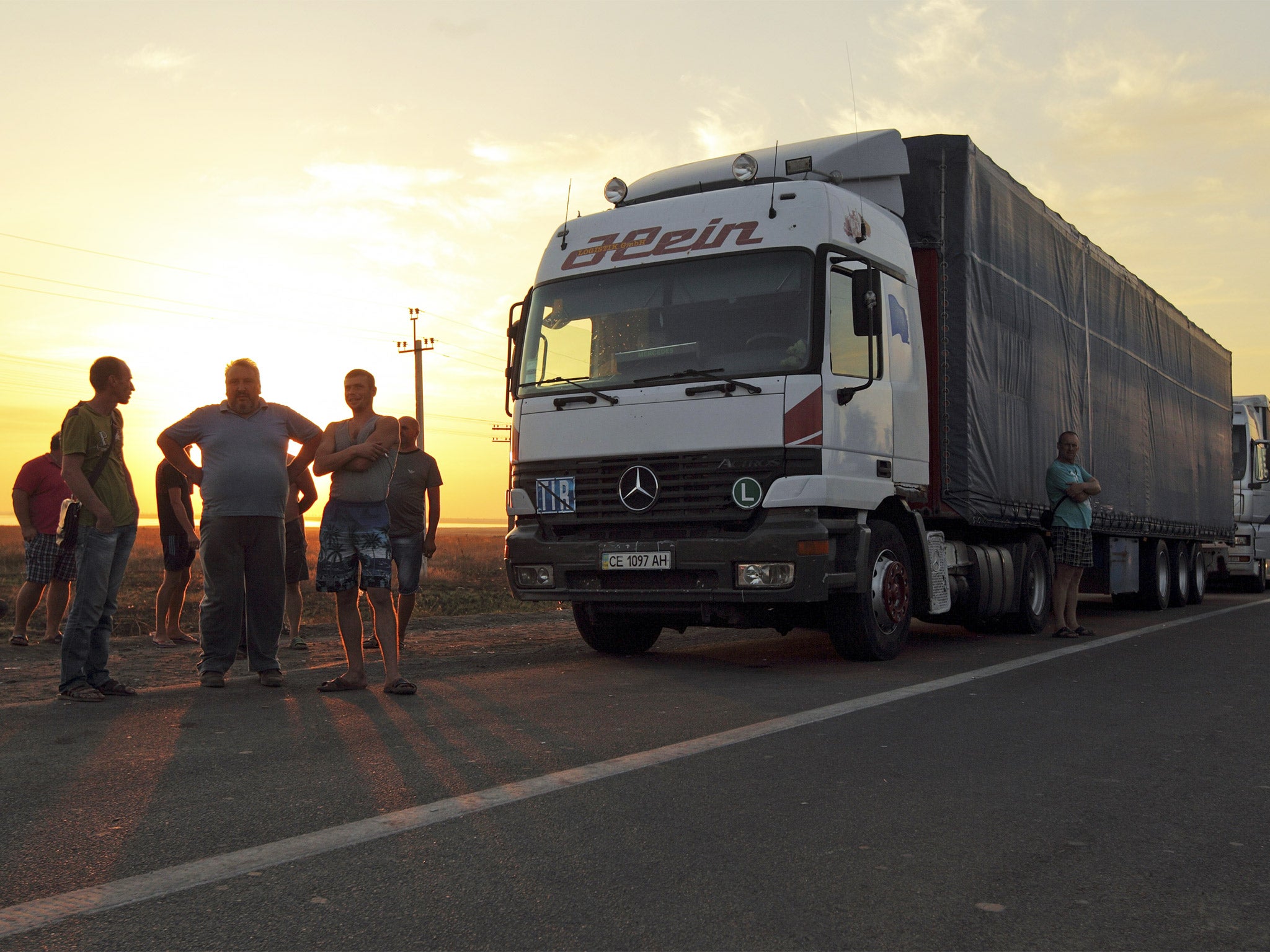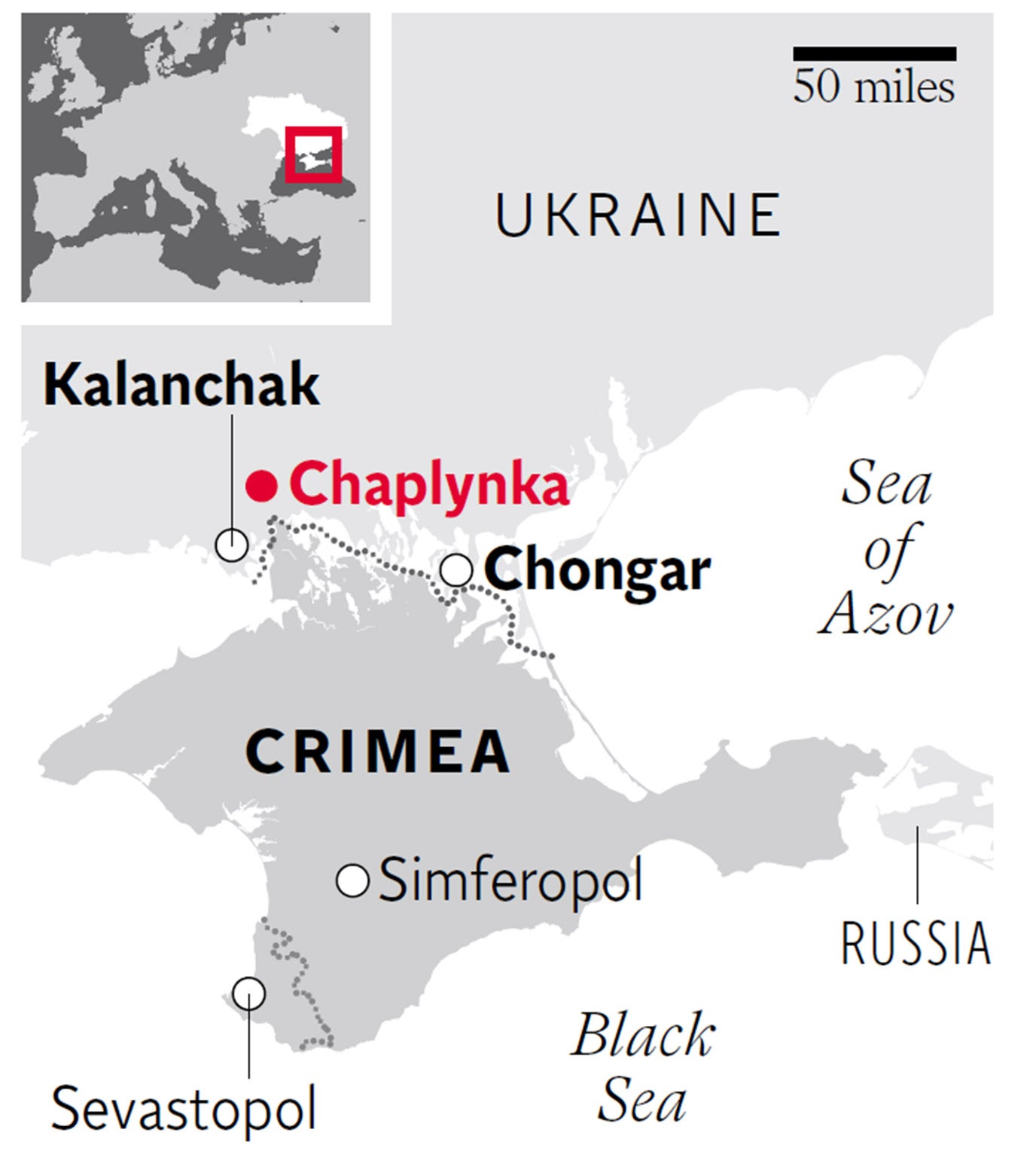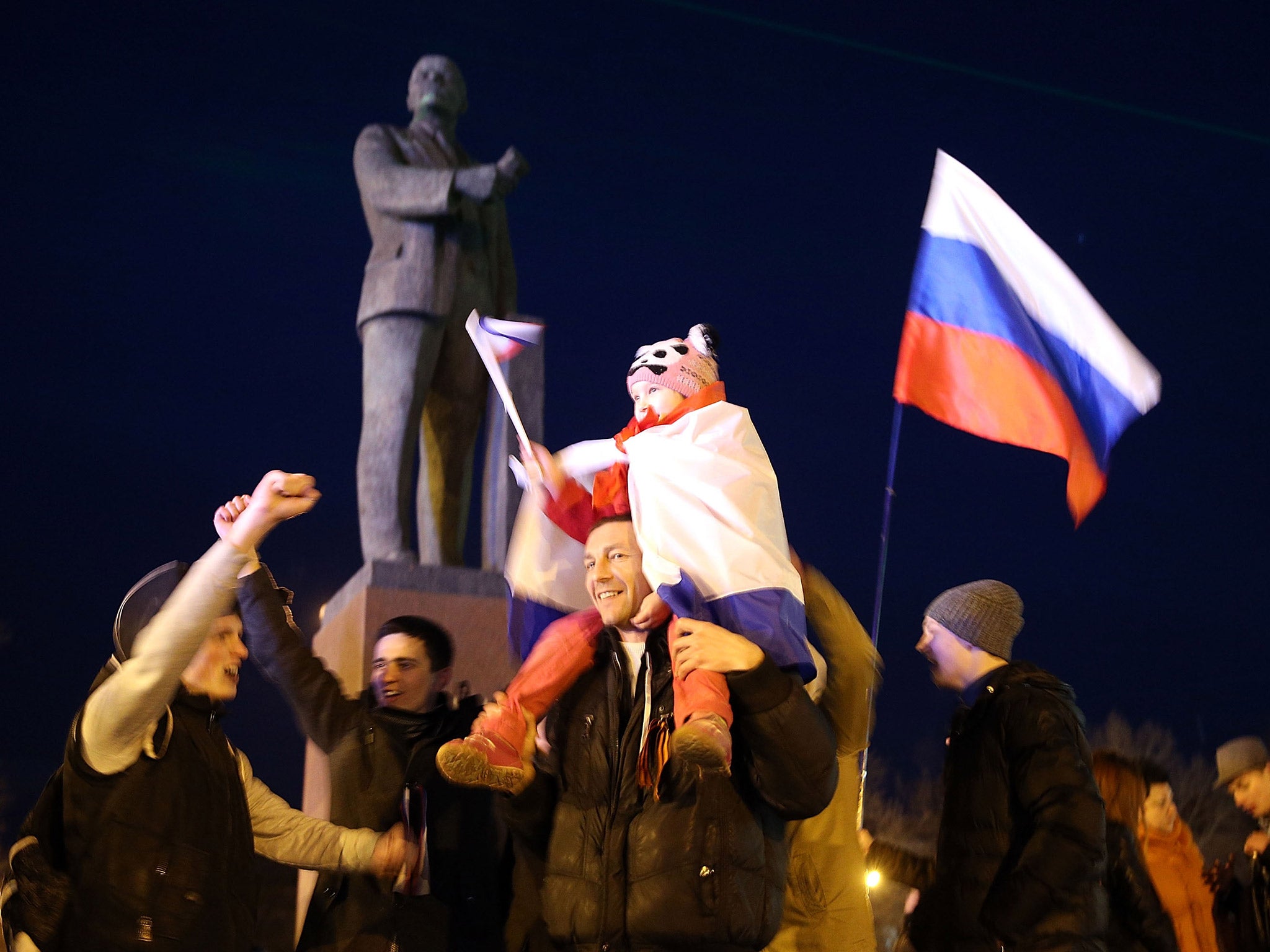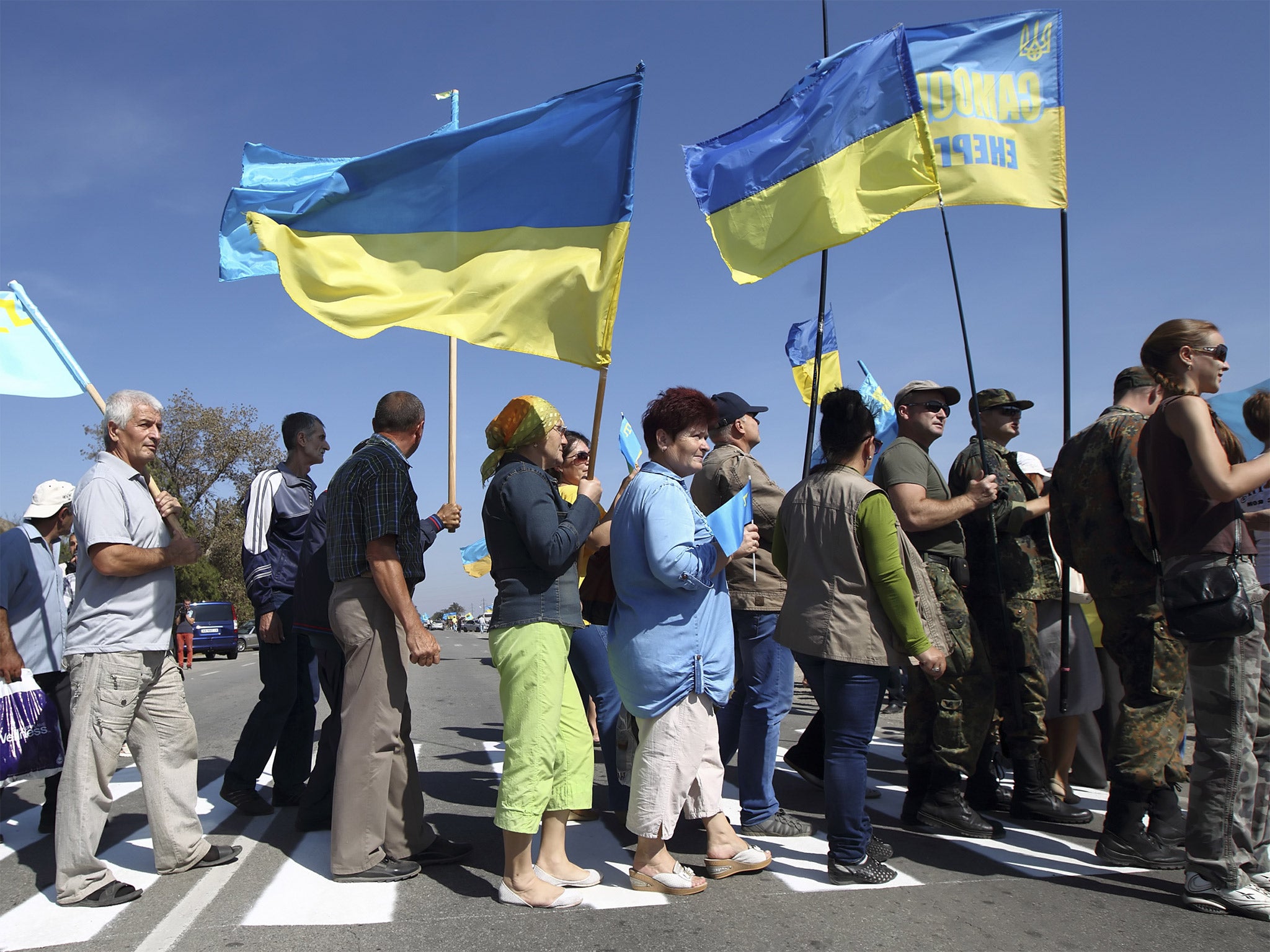Ukraine crisis: Crimean Tatars' border blockade of their 'occupied' peninsula could strangle the economy and invite forceful response from Russia
Representatives of the close-knit minority say blockade will remain in place indefinitely, but others doubt their ability to continue to block such a lucrative trade route

“You’ve got to make up your mind”, Mustafa Dzhemilev said. “You’re either at war, or you’re trading with the enemy.” The leader of the Crimean Tatars, 71, was dwarfed by the lorries lined up behind him at the Chaplynka border crossing.
But his diminutive figure belied a steely determination, forged by a life of activism against Russian adversaries. The newly launched campaign to block an important trade lifeline between Ukraine and “occupied” Crimea might be his most important yet.
The Crimean Tatars are a close-knit, minority population (12 per cent) inside the majority-Russian (58 per cent) Crimea. They were part of a significant minority that did not welcome Moscow’s annexation last year and they retain a strong historical grievance with Russia because their entire population was deported to Central Asia on the orders of Stalin in 1944. Mr Dzhemilev was just six months old at the time.
In exile, he became a famous dissenting voice. In 1975 he went on a hunger strike, campaigning for his people’s return to their homeland – he was persuaded to end it after 303 days by another famous dissident, Andrei Sakharov.

Mr Dzhemilev was only able to move back to Crimea in 1989 as the Soviet Union began to crumble. Shortly after his return he was elected as head of the Tatar consultative parliament, the Mejlis, and in 1998 he entered the Ukrainian national parliament as an MP.
When Russia prepared to annex Crimea in March last year, it was only natural that President Putin and his allies should turn to Mr Dzhemilev in their attempts to ensure a smooth passage for their military strategy. He was flown in to Moscow: whisked from the plane in a limousine to a special conference room with a direct line to the President. They spoke for 40 minutes but Mr Dzhemilev did not budge. “He told me that our future would be better in Russia, that all the problems that had amassed over 20 years of Ukrainian rule would be resolved in months,” recalled Mr Dzhemilev. “I told him our population would not welcome Russian occupation, since the last time it happened half our people perished.” The Crimean Tatars did not believe a Russian presence would serve them well, he told Mr Putin. What was needed were negotiations between Ukraine and Russia, and full a withdrawal of Russian “little green men” from Crimea.
Mr Dzhemilev admits he anticipated an angry response from Mr Putin but instead was told that his words “showed he was a man who loves his homeland”. Mr Dzhemilev was told to come to Moscow and use the same presidential hotline if ever he changed his mind. The two men had agreed to disagree.

Three days later pro-Russian Crimeans voted, in a much-disputed ballot, for annexation. Just weeks after his conversation with Mr Putin, Mr Dzhemilev was stopped from entering Crimea from mainland Ukraine and told he would not be allowed back in until 2019. “I told them that they were very optimistic if they thought they could hang on to Crimea till then,” recalled Mr Dzhemilev.
To some extent the Crimean Tatars’ worst fears have been realised, with a worrying pattern of extrajudicial arrests, violence, disappearances and murder emerging from the peninsula. Last week, a report from the Organisation for Security and Co-operation in Europe said there were “numerous credible, consistent and compelling accounts of human-rights violations and legal irregularities” in the new Crimea.
Crimean Tatar authorities claim the de facto, Russian-installed authorities have been responsible for some 22 murders and disappearances of Tatars since Crimea was annexed. The authorities deny this. The alleged killings began with Reshat Akhmetov, who was bundled into a car after demonstrating with a Ukrainian flag in central Simferopol. He was found dead a few days later with stab wounds across his body and eyes.
The disappearances continue. A few weeks ago, three members of the Crimean Tatar community were reported missing; two have already been found dead. “The authorities say they’ve found the killer but can’t say who he is, other than that he is Ukrainian, how he killed two big men or how he managed to bury them,” said Mr Dzhemilev. “It’s the stuff of fairy-tales.” He said the murders were the direct work of the de facto authorities, designed to further frighten the Crimean Tatar population.

Among the 200 or so demonstrators present on the Crimean border when The Independent visited was Larisa Shaimardanova, the mother of Timur Shaimardanov, an activist who disappeared in Simferopol on 26 May last year. Breaking down in tears, she said she had been ignored by both Russian and Ukrainian authorities since his disappearance. She has since moved to greater safety on the Ukrainian side of the border.
Since coming into force at noon on Sunday, the blockade here has been largely effective – much to the chagrin of lorry drivers who had been waiting days for customs clearance. At one point, there were more than 200 lorries being held at the three border crossings in Chongar, Chaplynka and Kalanchak but by Tuesday evening several dozen had decided to turn around.
Ukrainian President Petro Poroshenko, who initially adopted a position of studied neutrality, has since offered some support for the “civilian” protest. The state would ensure the security of those protesting at the border, he said. But questions emerged about co-operation between state border guards, the exiled Crimean Tatar authorities and the nationalist far-right paramilitaries who have also arrived on the scene after declaring support for the blockade last week.
Mr Dzhemilev insisted that the paramilitary groups were present without the Tatars’ invitation and that there had been no talks or agreement with them prior to the action. “We took steps to warn them that we didn’t want any violence or political agitation,” he said. But he added that he welcomed “anyone who peacefully supports the territorial integrity of Ukraine”.
Artem Skoropadsky, a spokesman for Right Sector – by far the most visible of the paramilitary forces present – said his leadership had met Crimean Tatar representatives and were now co-ordinating their activities. He confirmed that the group had a total of 150 men across the checkpoints.
Crimean Tatar representatives said the blockade was in place indefinitely, but others doubt their ability to continue to block a lucrative trade route. There is also the prospect of a Russian reaction. Crimea’s ports are largely cut off from international shipping because of the Western-led economic boycott so the removal of cheap Ukrainian produce would lead to rapid inflation on the peninsula. It would only be a matter of time before the Russian side put pressure on Ukraine to end the blockade.
Meanwhile, Europe’s diplomatic outlook is one which now privately accepts that Crimea is unlikely to be returned to Ukraine soon. But Mr Dzhemilev has harsh words for such positions, likening the view to the “short-sighted politics” of 1938. “Chamberlain said he brought peace and he brought the Second World War,” he said. “If they forget about Crimea, they might as well forget about Western Europe.”
Join our commenting forum
Join thought-provoking conversations, follow other Independent readers and see their replies
Comments